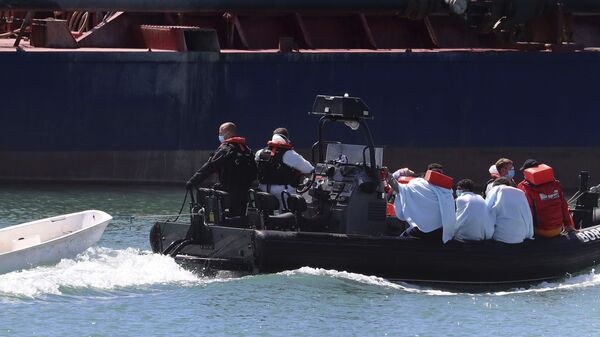Dan O'Mahoney, the UK's 'Clandestine Channel Threat Commander', who was appointed to his current position by Home Secretary Priti Patel in August, said Britain was "very close" to being able to use a new "safe return tactic" which will halt the flow of boats.
Speaking to The Daily Telegraph, O'Mahoney said that the UK government was using social media campaigns to urge would-be migrants in Africa and the Middle East to claim asylum in the first safe country in which they arrive, rather than risking their lives in an "incredibly dangerous journey" to reach the UK illegally.
His remarks came after it emerged that the UK government was considering using offshore holding centres, disused prisons or retired ferries to temporarily accommodate those who reach the UK illegally.
The number of clandestine arrivals to the UK is currently exceeding 300 per day - the highest numbers on record. In 2019, less than 30 percent of illegal entries into the UK was used via small boats but that has now surged to 70 percent as the coronavirus pandemic has hit rail and air travel.
O'Mahoney added: "We definitely are very, very close to being able to operationalise a safe return tactic where we make an intervention safely on a migrant vessel, take migrants on board our vessel and then take them back to France. The problem with that currently is that the French won't accept them back to France."
Commenting earlier on the matter, O'Mahoney said that the envisaged method mirrored a method trialled by the Royal Navy in which nets were used to clog propellers and bring the boats to a standstill. He added that the tactic was one of many that the Navy may deploy over the next few months and that he was working with maritime security departments across law enforcement and the military to come up with new tactics to tackle the problem.
The number of people who applied for asylum in the UK in 2019, the last full year for which data is available, was 35,566, an increase of 21% on the previous year. This year the number is expected to be higher, according to the UK government.
According to UNHCR statistics, at the end of 2018 there were 126,720 refugees, 45,244 pending asylum cases and 125 stateless persons in the UK. Iran was the top nationality claiming asylum in the UK in the year ending March 2020. The top five countries of nationality for asylum applications were: Iran (4,741), Albania (3,467) , Iraq (2,696) and Pakistan (1,848).





